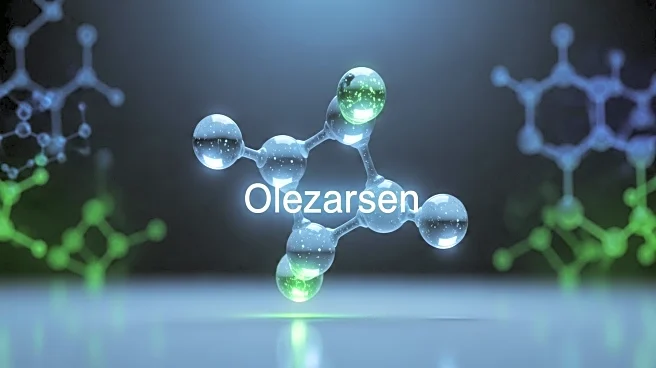What is the story about?
What's Happening?
Ionis Pharmaceuticals has announced significant positive results from two Phase III trials for its drug olezarsen, aimed at treating severe hypertriglyceridemia (sHTG). The trials, CORE and CORE2, demonstrated a substantial reduction in fasting triglycerides and acute pancreatitis events, with favorable safety and tolerability. Olezarsen, an antisense oligonucleotide, is designed to lower apolipoprotein-CIII production, a protein that regulates triglyceride metabolism. Following these results, Ionis plans to file a supplemental New Drug Application with the FDA by the end of the year, with a potential launch in 2026. The announcement led to a 42% surge in Ionis' stock price, reflecting investor confidence in the drug's market potential.
Why It's Important?
The successful trial results for olezarsen highlight its potential to address unmet needs in the treatment of sHTG, a condition associated with high triglyceride levels and increased risk of acute pancreatitis. The drug's development could significantly impact the pharmaceutical market, potentially becoming a blockbuster with sales exceeding $1 billion. This development is crucial for patients with sHTG, offering a new therapeutic option that could improve health outcomes. Additionally, the positive data strengthens Ionis' position in the competitive RNA-targeted therapy market, potentially influencing the strategies of other companies developing similar treatments.
What's Next?
Ionis plans to present detailed trial data at an upcoming medical conference and submit a supplemental New Drug Application to the FDA. If approved, olezarsen could be launched for sHTG treatment in 2026. The company is also preparing for the launch of another drug, Zilganersen, for Alexander disease. Analysts have raised their sales forecasts and price targets for Ionis, indicating strong market expectations. The success of olezarsen may pressure competitors like Arrowhead Pharmaceuticals to accelerate their own drug development efforts in the sHTG space.
Beyond the Headlines
The trial results for olezarsen not only validate its clinical efficacy but also underscore the potential of antisense oligonucleotide therapies in treating metabolic disorders. This could pave the way for further innovations in genetic and molecular medicine, influencing future research and development strategies. The success of olezarsen may also encourage investment in similar therapeutic approaches, potentially leading to breakthroughs in other areas of unmet medical need.















